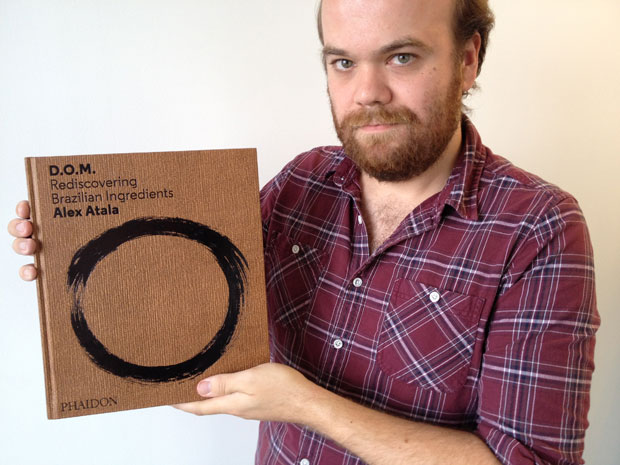
Introducing D.O.M.
Phaidon editor Daniel Hurst previews our latest gastronomy book D.O.M. Rediscovering Brazilian Ingredients - and talks about how the brilliant larger than life São Paulo chef Alex Atala is revolutionising Brazilian cooking
Rediscovering Brazilian Ingredients
D.O.M. Rediscovering Brazilian Ingredients is an exclusive look at one of the world’s most exciting chefs, his unique relationship with the produce of his native Brazil and the food he creates from it. Currently at number 6 in the San Pellegrino 50 Best Restaurant Awards, Alex Atala’s restaurant D.O.M has built its unique style of cuisine on the discovery and exploration of Brazilian ingredients combined with a commitment to finding sustainable solutions to sourcing them to the benefit of the Amazon and its people. A former DJ who was classically trained as a chef in Europe, Atala refuses to import ingredients such as caviar, truffles and fois gras, staples in many high-end restaurant kitchens, into Brazil and instead scours the Amazon for indigenous produce to fuse with classical techniques in his cooking. He then works with the Amazon’s native communities and small-scale producers to extend the availability of these native products throughout Brazil.
Phaidon Production Manager Alenka Oblak was involved in choosing the materials for D.O.M. Rediscovering Brazilian Ingredients, making sure that the papers chosen for it and the processes employed all went towards creating a book that, as she says, "talks to the hands", as well as the eyes.
"It all started with a coconut. The idea was for the book to resemble something earthy, something from the forest. We hit upon the coconut fabric - the feel the look, the texture. We realised from the very beginning though that it was going to be very difficult to get that look. I approached several different paper suppliers who specialise in slightly different materials in order to get closer towards the coconut look and feel. But it was a real test on the alternative papers and for a while it didn't quite work. While I was researching I came across a paper which has visible "wooden" fibres in light hazelnut colour against the dark brown colour. Then I created a special brass and I applied it on the pre-printed wrapping paper in order to get this heavy texture so that the book feels rough to the touch. After doing tests in England, in Italy, in China we got the result we wanted but I think I went through 15 different rounds of tests. We spread the edges with a green colour in order to give a rain forest feel to it. It works really well and, as many people have commented, creates a nice contrast with the brown of the cover. We had two photographers: one supplied the atmospheric images, the other supplied the recipes and the clarity on both is amazing. I must say that it was very pleasurable and enjoyable to work on the colour-proofing process for this book. The book contains two papers - coated and uncoated. I did a few different print trials with paper stock to get the best result and Paul (McGuinness, Production Manager) and I had to test different varnishes because the food pictures are very heavily inked and if you don't apply varnish to seal them you risk that the images will mark the facing pages. I was very pleased when I got the result because we had gone through so many rounds of tests. It's a very tactile book. It talks to the hands and really plays with texture."
Brazilian chef Alex Atala started cooking during what he calls a classic backpacking trip around Europe. "I had the honour to work in Belgium, France and Italy and from each of those places I brought a lesson learned, a message, which are all present in my work today," he says. On his return to his native Brazil in 1994 he began working for various restaurants, creating the dishes from the lessons he'd learned in Europe and subtly adapting them along the way to incorporate his own Brazilian heritage In 1999 he opened D.O.M and this year he was voted one of the 100 most influential people in the world by TIME magazine. René Redzepi's led the accolades. "I first met Alex Atala in London at the World's 50 Best Restaurants awards in 2006. We were but insects among giants and stood sheepishly in a corner, trying to catch a glimpse of the "real" chefs we had long admired. The announcer began the countdown with No. 50, which was Alex's restaurant, D.O.M. He stood up and began striding toward the stage. He'd gotten about halfway there - the room silent, all eyes on him - when the announcer cried out, "No, no, you're not meant to come up here!" And just like that, everyone knew who Alex was. Alex is one of the most dedicated people I have encountered in our industry. Selflessly, he has surrendered to the enormous task of shaping a better food culture for Latin America. His philosophy of using native Brazilian ingredients in haute cuisine has mesmerized the continent. In hindsight, Alex's taking centre stage that day in 2006 was an omen. An insect no more, he is a giant among chefs."
D.O.M.
50 Best Restaurants citation
Cook it Raw
WSJ Sao Paulo food markets tour with Alex Atala
Alex Atala's ATA Institute
Alex Atala's eight rules for success
Alex Atala on YouTube




